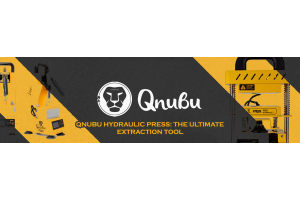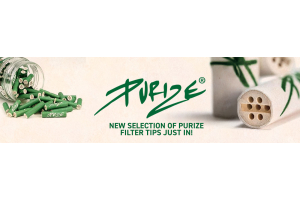Qnubu has quickly emerged as a go-to brand in the herbal extraction industry, especially for users looking for high-quality, efficient, and user-friendly rosin presses. With innovation at its core and a commitment to safe, solventless extraction methods, Qnubu has gained popularity among both home users and professionals. The name "Qnubu" has become synonymous with quality and reliability, and their product range reflects a deep understanding of user needs and industry standards.
If you’re new to the world of rosin extraction, understanding what makes Qnubu stand out is crucial. They specialize in machines that apply controlled heat and pressure to extract oils from plant material Their presses are built to deliver precise results without the use of chemicals, making the extraction cleaner and the final product purer. Whether you're making small batches at home or looking for a tool to scale your operation, Qnubu's offerings cover every need.
Beyond their mechanical expertise, Qnubu also places emphasis on user experience. Their machines are compact, intuitive, and built to last. Over the years, this Spanish-based company has developed a cult following, especially in Europe and the UK, thanks to their consistency and innovation in design.
Let’s dive deeper into what a hydraulic press actually is and why Qnubu’s models, especially the newly released Cold Brick 4 Tons Manometer Press, are turning heads.
What Is a Hydraulic Press and How Does It Work?
A hydraulic press uses hydraulic cylinders to generate a compressive force. It works based on Pascal's Law, which states that pressure applied to a confined fluid is transmitted uniformly in all directions. In simpler terms, a small amount of force applied to a small piston can create a massive force on a larger piston—ideal for compressing plant material for rosin extraction.
Here’s how it works:
-
The user loads plant material into a parchment paper envelope or a pressing bag.
-
The loaded material is placed between the heated plates of the press.
-
The hydraulic mechanism applies intense pressure to the plates, squeezing the plant material.
-
The combination of pressure and (sometimes) heat extracts the rosin from the plant matter.
-
The golden, sticky rosin oozes out and is collected on the parchment paper.
What makes hydraulic presses particularly attractive is the high level of control and force they offer. This method ensures a better yield and a cleaner extract compared to manual pressing methods. Hydraulic presses like those from Qnubu allow you to extract more efficiently, maximizing your material and minimizing waste.
For extractors who want precision, consistency, and power, hydraulic presses are the go-to. And among the many available, Qnubu’s models, particularly the Cold Brick 4 Tons Manometer Press, are shining examples of what cutting-edge pressing technology should be.
Cold Pressing vs. Hot Pressing: What's the Difference?
When it comes to rosin extraction, both cold pressing and hot pressing are popular techniques, each with its own unique set of benefits and outcomes. Choosing the right method often depends on what you prioritize—flavor, potency, or yield.
Cold Pressing:
This method involves using lower temperatures (usually between 160°F–190°F) and longer pressing times. Cold pressing tends to preserve more of the plant’s terpenes and flavonoids, which means the end product is often more aromatic and flavorful. However, the yield can be slightly lower compared to hot pressing. It’s a great method for connoisseurs who prioritize taste and smoothness over sheer quantity.
Hot Pressing:
Hot pressing uses higher temperatures (typically around 190°F–220°F) and shorter pressing times. This method often results in a higher yield, as the heat helps loosen and release more oils from the plant material. While some terpenes may be lost in the process, the end result is usually more potent and abundant.
With the Qnubu Cold Brick 4 Tons Manometer Press, users have the ability to cold press with incredible control and consistency. The inclusion of a manometer and the ability to exert 4 tons of pressure ensures that even at low temperatures, you’re getting an optimal yield with minimal degradation of quality.
This flexibility means you can experiment with both methods and find what works best for your material and your preferences.
Why Choose Qnubu for Rosin Pressing?
Brand Overview – Quality and Innovation
Qnubu is not just another press manufacturer. They’ve spent years perfecting their craft and listening to feedback from extractors, and hobbyists alike. The result? Machines that are efficient, durable, and packed with features that cater to both beginners and seasoned professionals.
Here’s why Qnubu stands out:
-
Durability: Their presses are made from high-grade materials designed to handle intense pressure over long periods.
-
Innovation: Features like integrated manometers, customizable temperature settings, and ergonomic designs set them apart.
-
User-Friendly Design: Whether it's a beginner looking for a plug-and-play solution or a pro wanting detailed control, Qnubu caters to all.
-
Global Availability: Especially in the UK and Europe, their products are widely available through trusted retailers like PureSativa.
And it’s not just about machinery. Qnubu also offers a full ecosystem of accessories, from pressing bags and parchment paper to storage solutions. It’s a brand built for extractors, by extractors.
Up next, let’s dig into their newest innovation — the Qnubu Cold Brick 4 Tons Manometer Press — and explore what makes it a standout tool.
Introducing the Qnubu Cold Brick 4 Tons Manometer Press
Key Features and Benefits
This press is a game-changer for anyone serious about rosin extraction. Compact yet powerful, it combines brute hydraulic strength with precision engineering for top-tier performance.
Integrated Manometer for Precision
The built-in manometer allows you to monitor the exact pressure applied during pressing. This ensures consistency across sessions and helps fine-tune your technique for optimal results. No more guessing games — just precise, repeatable outcomes.
4 Tons of Power for Maximum Efficiency
With 4 tons of hydraulic pressure at your disposal, this press can handle dense material with ease. Whether you're working with flowers or sift, the Cold Brick ensures full extraction without damaging terpenes or cannabinoids.
Mold Dimensions – Perfect for Consistency
The 6x12 cm mold is ideal for uniform pressing. It accommodates a decent volume of material while maintaining consistent results across the board. This makes it a perfect choice for small-batch and personal use alike.
Whether you’re new to pressing or looking to upgrade your setup, the Qnubu Cold Brick 4 Tons Manometer Press brings professional-grade performance into the comfort of your home.










